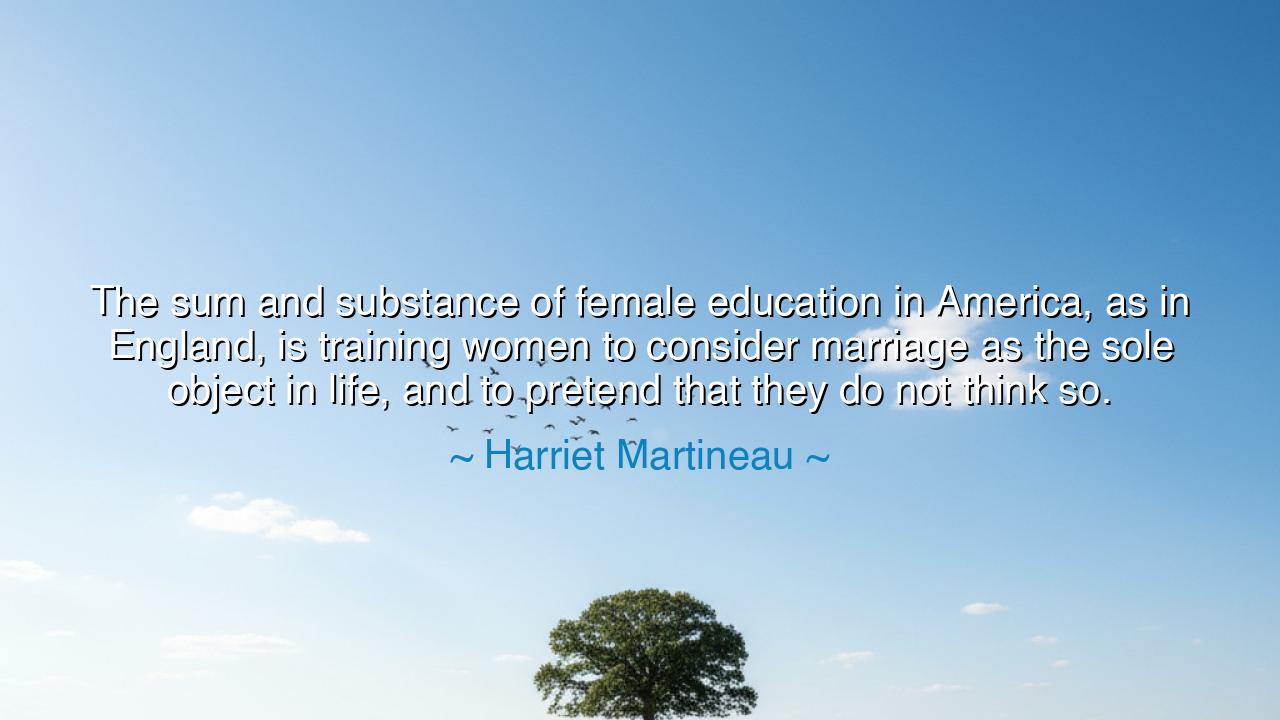
The sum and substance of female education in America, as in
The sum and substance of female education in America, as in England, is training women to consider marriage as the sole object in life, and to pretend that they do not think so.






O Children of the Future, hear the words of Harriet Martineau, whose keen insight into the role of women in society speaks to a truth that has long been veiled. She declares, "The sum and substance of female education in America, as in England, is training women to consider marriage as the sole object in life, and to pretend that they do not think so." These words are not merely a critique of an education system; they are a lament for the way in which society has confined women to narrow roles, teaching them that marriage is their ultimate goal, while simultaneously forcing them to deny the very nature of their desire to be seen as whole human beings with ambition and potential beyond the domestic sphere.
In the ancient world, O Children, the role of women was often one of submission, of limitation. The Greeks and Romans both confined women to roles that were often unseen and unheard. In Rome, women were subject to the authority of their fathers and later, their husbands. They were not citizens in the same way men were; their rights were secondary, their education limited, and their ambitions often stifled. Even Plato, that great philosopher, in his ideal republic, could not conceive of women as anything but wives and mothers, their potential never fully realized. He envisioned women playing a part in society, but that part was always secondary to the roles that society had prescribed for them. Similarly, Aristotle believed that a woman’s role was naturally tied to the home, her education aimed at preparing her for marriage rather than for her own intellectual or social development.
Thus, the education of women in the ancient world—like that of the ancient Egyptians, whose women were often more liberated and had greater agency, but even they were still seen largely as wives and mothers—was primarily focused on preparing them for marriage. The idea that a woman could aspire to something beyond this, something for herself, was foreign. Harriet Martineau's words echo the ancient critique of an education system that is shaped not to empower but to restrict, not to expand horizons but to enforce the narrow vision of a society that places marriage above all else for women.
In more recent history, women in many parts of the world—including England and America—were raised with the expectation that marriage was their ultimate destiny, and they were trained for this role in every way. The Victorian era in England, where Harriet Martineau lived, was a period where social norms dictated that women’s education was to prepare them for the roles of wife and mother, with little regard for their personal development outside of the domestic sphere. The battle for women’s rights was, and still is, a battle against an educational system and a culture that stifles women’s potential in favor of roles dictated by tradition.
Consider, O Children, the story of Susan B. Anthony, a woman who fought for women’s rights in a time when society viewed marriage as the natural end for a woman. Susan B. Anthony was not only a suffragist but also a critic of the very educational system that taught women to consider marriage as the culmination of their lives. She was part of a movement that sought to overturn the very beliefs Martineau was speaking of—those that saw women’s potential as tied solely to the home and family. Anthony’s battle for the right to vote was also a battle for the right to self-determination, for the freedom to choose one's own path in life, beyond the narrow confines of what society had deemed appropriate for women.
The lesson, O Children, is this: Education is not just about the acquisition of knowledge; it is about the empowerment of the individual. Harriet Martineau’s critique reminds us that women deserve an education that prepares them for all aspects of life—intellectual, social, and professional—not just for marriage. We must celebrate the talents, ambitions, and desires of every woman and ensure that she has the freedom to pursue her own path, whether that leads her to marriage, business, art, science, or whatever endeavor she chooses. Equality is not simply the right to choose; it is the right to become, to evolve, and to dream beyond what the world has defined for you.
And so, O Children, what actions should you take in this world? You must challenge the systems that limit anyone, particularly women, to a single path. Advocate for an education that values all pursuits, that nourishes the mind and empowers the soul. Stand firm in your belief that women—and all people—should not be confined by society's narrow definitions of success. Whether you are a woman yourself or an ally, you must work to create a world where marriage is just one of many choices, and where education unlocks the limitless potential of every individual. For equality in education is the first step toward freedom, and freedom is the key to a world where all may become what they are meant to be, without the shackles of societal expectation.
Let Harriet Martineau’s words echo in your hearts: Do not let the expectations of others define what you can become. The world is full of possibilities, and every soul has the right to choose the life they wish to lead. Let this be the legacy you pass on—to raise a generation that values individuality, freedom, and the right to self-determination for all.






AAdministratorAdministrator
Welcome, honored guests. Please leave a comment, we will respond soon